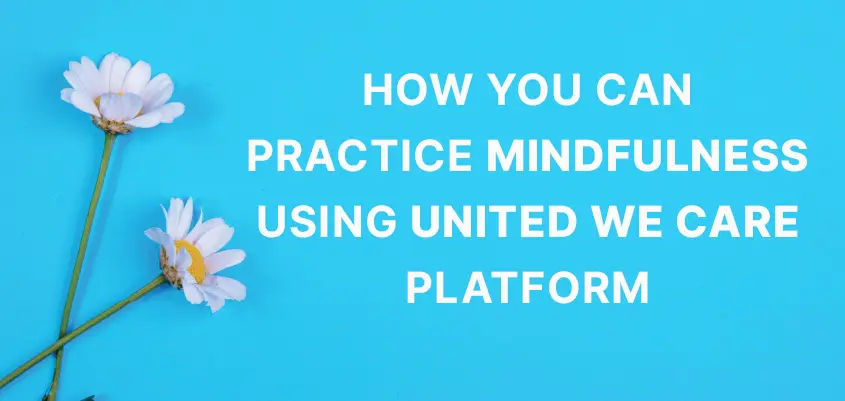Introduction
In recent years, mindfulness has become a popular method of improving one’s quality of life. This article will discuss learning and incorporating it into one’s life. This article will discuss mindfulness and how to reap its benefits with the United We Care platform [1]. United We Care offers a 5-week course on mindfulness to help people understand and practice this technique.
What Is Mindfulness?
Mindfulness involves cultivating a deep awareness of our inner selves and learning to accept ourselves without judgment. This valuable skill can bring significant physical and psychological benefits when practiced consistently.
Mindfulness practice comes from Buddhism and Hinduism and is one of the core teachings of Buddhist Philosophy. Kabat-Zinn, a researcher, has written extensively on Mindfulness. He further mentions that mindfulness is a type of attentiveness that is compassionate and affectionate and is like a social presence that shows interest in the present moment [2].
The words mindfulness and meditation have been used interchangeably in the contemporary world. However, while mindfulness is more to do with directing one’s attention to the present, meditation may often have other aspects like sitting still, doing visualizations, etc.
Mindfulness is the “awareness of the present moment with acceptance” [3]. This state of sustained moment-to-moment awareness is challenging to cultivate oneself, especially in times of emotional turmoil. Fortunately, it is a skill anyone can develop with practice [3].
Learn to know more about- The benefits of Mindfulness
What Is The Science Of Mindfulness?
“Mindfulness” as a practice is now being used as an intervention in treating many psychological and physical diseases. The effectiveness of these interventions has attracted a lot of research that asks the question: why does it work?
Researchers have noted that mindfulness impacts a person’s current state and traits in the studies conducted. It is known to induce a change in the form of the person practicing, affecting the way in which the brain is active. Further, regular practice can cause a difference in the personality or traits of that person [4]. Mindfulness affects both a person’s mind and patterns) and brain.
Read more about– the negative effects of Meditation
Effect Of Mindfulness On A Person’s Mind
Psychologists recognize that automatic thoughts and behaviors underlie a person’s worry, stress, intrusive thoughts, and habitual coping. Mindfulness induces a state of mind opposite to this: a condition that is “purposeful” and conscious [5]. Thus, one can observe their experience without impulsively acting on it. Mindfulness also helps an individual develop a more objective, flexible, and non-reactive approach to one’s internal experiences (such as the inner experience of stress or anxiety) [6], which increases emotional regulation and coping in that person.
Effect Of Mindfulness On A Person’s Brain
In terms of physiology, studies have used neuroimaging, such as EEG and functional MRI, to note the effect of mindfulness. There has been increased activity in brain areas responsible for attentional capacity, cognitive control, and body awareness [5]. Changes have also been observed in areas responsible for memory, learning, emotional management, perspective taking, and processing of information related to self [7].
What Are The Impacts Of Mindfulness?
Mindfulness practice has an enormous physical and psychological impact. Some of these benefits include:
- Reduction in Stress [8] [9]
- Reduction in symptoms of depression and anxiety [9]
- Increase in emotional regulation (that is, the ability to manage one’s emotions) [10]
- Improvement in interpersonal relationships [10]
- Reduction in job-related emotional exhaustion and an increase in job satisfaction [11]
- Progress in brain function and immune system [12]
- Reduction in inflammation related to the progression of several diseases and late-life mortality rates [13].
- Improvement in sleep [14]
- Reduction in chronic pain [15]
- And Improvement in overall quality of life [15]
Mindfulness practice allows individuals to enhance their quality of life and combat many physical or emotional issues.
How To Get Started With Mindfulness?
The benefits of mindfulness are in-depth above, but the practice can be challenging, especially for individuals who have just begun their journey. It thus becomes imperative to have a master or a professional as a guide when one begins their journey.
The United We Care platform offers a 5-week mindfulness course [1] for individuals seeking to start a mindfulness practice. The comprehensive approach helps the practitioner with the following:
- Developing an understanding of what mindfulness is and how it is different from meditation
- Finding tools and techniques to employ mindfulness in daily life
- Learning how to visualize positivity through mindfulness
- Learning ways to explore one’s “inner landscape.”
- Achieving calmness and relaxation using “sensory integration” practices
- And increasing awareness and patience when dealing with day-to-day events.
The course is delivered using videos and guided audio exercises. To get started with mindfulness, one simply needs to register with United We Care and find for themselves a dedicated time and space for the practice.
Learn more about- How can smartphone apps can help with Mindfulness
How Do You Make Mindfulness A Part Of Your Life?
The first step is for the individual to learn how to incorporate mindfulness into daily life. Once they have cultivated this skill, they can establish a continued practice by discovering a dedicated time and space each day.
One can also focus on developing the attitude of mindfulness along with the skill. Kabat-Zinn proposed a list of 7 attributes one must be mindful of daily [5]. These include:
- Being non-judgemental about one’s own experiences
- Being patient and letting things unfold at their pace
- Having a beginner’s mind that is receptive to new possibilities
- Developing trust in one’s self and feelings
- Creating a state of not striving to be or feel a certain way
- Accepting everything as it is at the moment
- Discarding old ideas about how things “should be.”
An attitude of mindfulness will make it easier to remember being mindful in most situations of life and thereby increase the satisfaction one has in life.
Conclusion
Mindfulness is entirely free of bias present at this moment; it is becoming increasingly popular. Individuals can perceive several physical and psychological benefits when developing mindfulness skills. Thus, one should begin with structured courses, such as those provided by United We Care, that help explain mindfulness.
References
- Find the right professional – United We Care. [Online]. Available: https://my.unitedwecare.com/course/details/get-started-with-mindfulness#down-here. [Accessed: 10-Apr-2023].
- J. Kabat-Zinn, “Mindfulness-based interventions in context: Past, present, and future.,” Clinical Psychology: Science and Practice, vol. 10, no. 2, pp. 144–156, 2003. https://onlinelibrary.wiley.com/doi/pdf/10.1093/clipsy.bpg016
- F. Didonna, R. D. Siegel, A. Olendzki, and C. K. Germer, “Mindfulness: What Is It? Where Did It Come From?,” in Clinical Handbook of Mindfulness, New York, NY: Springer, 2009, pp. 17–35. https://www.researchgate.net/profile/Linda-Carlson-2/publication/225192315_Mindfulness-Based_Interventions_in_Oncology/links/0912f50805be2495ff000000/Mindfulness-Based-Interventions-in-Oncology.pdf#page=47
- Y.-Y. Tang, “Traits and states in mindfulness meditation,” The Neuroscience of Mindfulness Meditation, pp. 29–34, 2017. https://www.nature.com/articles/nrn.2015.7
- A. Grecucci, E. Pappaianni, R. Siugzdaite, A. Theuninck, and R. Job, “Mindful emotion regulation: Exploring the neurocognitive mechanisms behind mindfulness,” BioMed Research International, vol. 2015, pp. 1–9, 2015. https://www.hindawi.com/journals/bmri/2015/670724/
- A. M. Christie, P. W. Atkins, and J. N. Donald, “The meaning and doing of mindfulness: The role of values in the link between mindfulness and well-being,” Mindfulness, vol. 8, no. 2, pp. 368–378, 2016.
- B. K. Hölzel, J. Carmody, M. Vangel, C. Congleton, S. M. Yerramsetti, T. Gard, and S. W. Lazar, “Mindfulness practice leads to increases in regional brain gray matter density,” Psychiatry Research: Neuroimaging, vol. 191, no. 1, pp. 36–43, 2011. https://www.ncbi.nlm.nih.gov/pmc/articles/PMC3004979/
- A. Chiesa and A. Serretti, “Mindfulness-based stress reduction for stress management in Healthy People: A Review and meta-analysis,” The Journal of Alternative and Complementary Medicine, vol. 15, no. 5, pp. 593–600, 2009. https://www.ncbi.nlm.nih.gov/books/NBK77489/
- I. Schreiner and J. P. Malcolm, “The benefits of mindfulness meditation: Changes in emotional states of depression, anxiety, and stress,” Behaviour Change, vol. 25, no. 3, pp. 156–168, 2008. https://www.habitualroots.com/uploads/1/2/1/3/121341739/the_benefits_of_mindfulness_meditation_changes_in__1.pdf
- D. M. Davis and J. A. Hayes, “What are the benefits of mindfulness? A practice review of psychotherapy-related research.” Psychotherapy, vol. 48, no. 2, pp. 198–208, 2011. https://citeseerx.ist.psu.edu/document?repid=rep1&type=pdf&doi=401c8aec24840da83edb646757795a9c6945509a
- U. R. Hülsheger, H. J. Alberts, A. Feinholdt, and J. W. Lang, “Benefits of mindfulness at work: The role of mindfulness in emotion regulation, emotional exhaustion, and job satisfaction.,” Journal of Applied Psychology, vol. 98, no. 2, pp. 310–325, 2013.
- R. J. Davidson and J. Kabat-Zinn, “Alterations in brain and immune function produced by mindfulness meditation: Three caveats: Response,” Psychosomatic Medicine, vol. 66, no. 1, pp. 149–152, 2004. http://www.drmccall.com/uploads/2/2/6/5/22658464/alterations_in_brain_and_immune_function_produced_by_mindfulness_meditation.pdf
- J. D. Creswell, M. R. Irwin, L. J. Burklund, M. D. Lieberman, J. M. G. Arevalo, J. Ma, E. C. Breen, and S. W. Cole, “Mindfulness-based stress reduction training reduces loneliness and pro-inflammatory gene expression in older adults: A small randomized controlled trial,” Brain, Behavior, and Immunity, vol. 26, no. 7, pp. 1095–1101, 2012. https://www.ncbi.nlm.nih.gov/pmc/articles/PMC3635809/
- D. S. Black, G. A. O’Reilly, R. Olmstead, E. C. Breen, and M. R. Irwin, “Mindfulness meditation and improvement in sleep quality and daytime impairment among older adults with sleep disturbances,” JAMA Internal Medicine, vol. 175, no. 4, p. 494, 2015.
- L. Hilton, S. Hempel, B. A. Ewing, E. Apaydin, L. Xenakis, S. Newberry, B. Colaiaco, A. R. Maher, R. M. Shanman, M. E. Sorbero, and M. A. Maglione, “Mindfulness meditation for chronic pain: Systematic review and meta-analysis,” Annals of Behavioral Medicine, vol. 51, no. 2, pp. 199–213, 2016.











